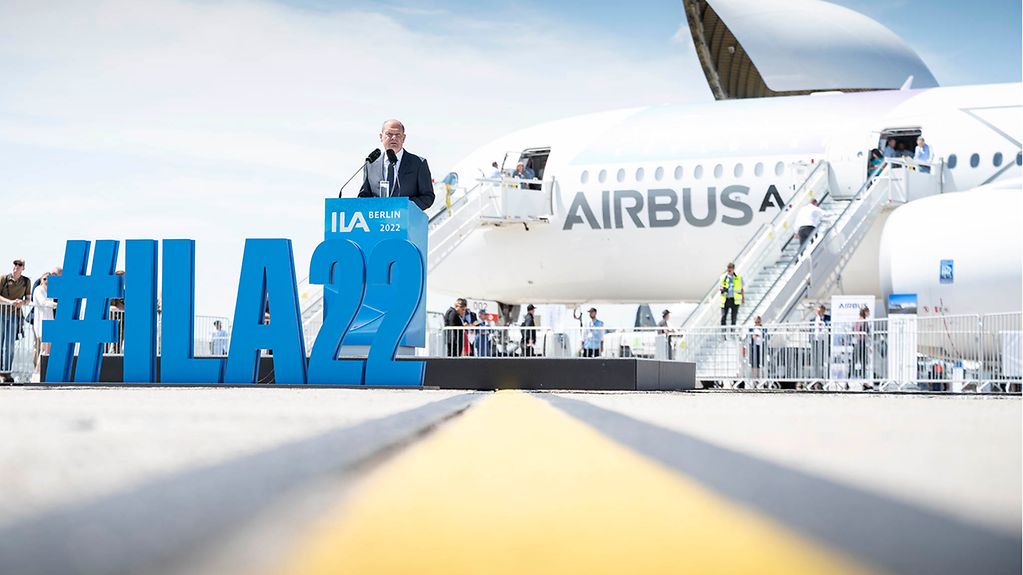International aviation exhibition
Federal Chancellor Olaf Scholz opened the International Aerospace Exhibition (ILA) in Berlin on Wednesday. Germany aims to be a pioneer in CO2-neutral flying. The future of aviation is climate-friendly, low-noise and highly innovative.
2 Min. Lesedauer

At the opening, Scholz said that the ILA “made him excited about the future of flying: climate-neutral, low-noise and highly innovative.”
Foto: Federal Government/Bergmann
At the opening of the ILA in Berlin on Wednesday, Federal Chancellor Scholz said: “Those who want to know what flying will look like in future in very real terms are in absolutely the right place at the ILA.” This industry stood for innovation and progress more than almost any other, he added. However, the transformation which lay ahead contained major challenges. In the long term, hydrogen-based and electric drive technologies must reach industrial maturity. The exhibition is already showing some very interesting developments and prototypes for this. “Basically, the question is how we can convert our economic model, which has been based on burning coal, oil and natural gas for almost 200 years, so that we can secure the future of our planet,” said Federal Chancellor Scholz.
The ILA is taking place from 22 to 26 June under the motto “Pioneering Aerospace”. 550 exhibitors from the aerospace industry are providing information about innovations in the industry at the ExpoCenter Airport, near to Berlin Brandenburg airport. The German Centre for Aerospace and the Federal Armed Forces are present.
Funding for key technologies
Space encompasses key future technologies. The German aerospace industry combines advanced technologies such as electronics, robotics, and measurement, control, materials and regulating technologies. Over 9 percent of the industry’s turnover goes into research and development. Ultimately, other branches of industry also benefit from innovations in this field, for example computer construction. The Federal Government funds key technologies for aviation using research resources from the aviation research programme and proportional development cost loans from the aircraft equipment programme. The Federal Government also wants to develop a new space strategy. entwickeln.
Aviation of the future will be climate neutral
Germany aims to be CO2-neutral by 2045. For future-viable aviation, the industry must contribute to reducing CO2 emissions and to enabling climate-neutral flying. The Federal Government wishes to actively support the air transport industry in this, with the aim of setting the course for more efficient aircraft and alternative forms of propulsion.
With the “Power-to-liquid roadmap”, the Federal Government and industry are showing that the fast ramp-up of alternative fuels here in Germany can succeed. The Federal and Länder Governments are funding research and development, from basic research to climate-neutral fuels and drive and system construction. A joint paper by the Federal Government summarises the efforts towards climate-neutral aviation.
Federal Minister for Economic Affairs Robert Habeck: “We must set the course for climate neutrality in aviation now. Development cycles in aviation are long. That’s why we must switch gear now. We are therefore deliberately accelerating the ramping up of green fuels and directing the aviation research programme more strongly towards the target of climate-neutral flying. Overall, it is clear that climate-neutral aviation is a difficult task, and we can only make progress together.”